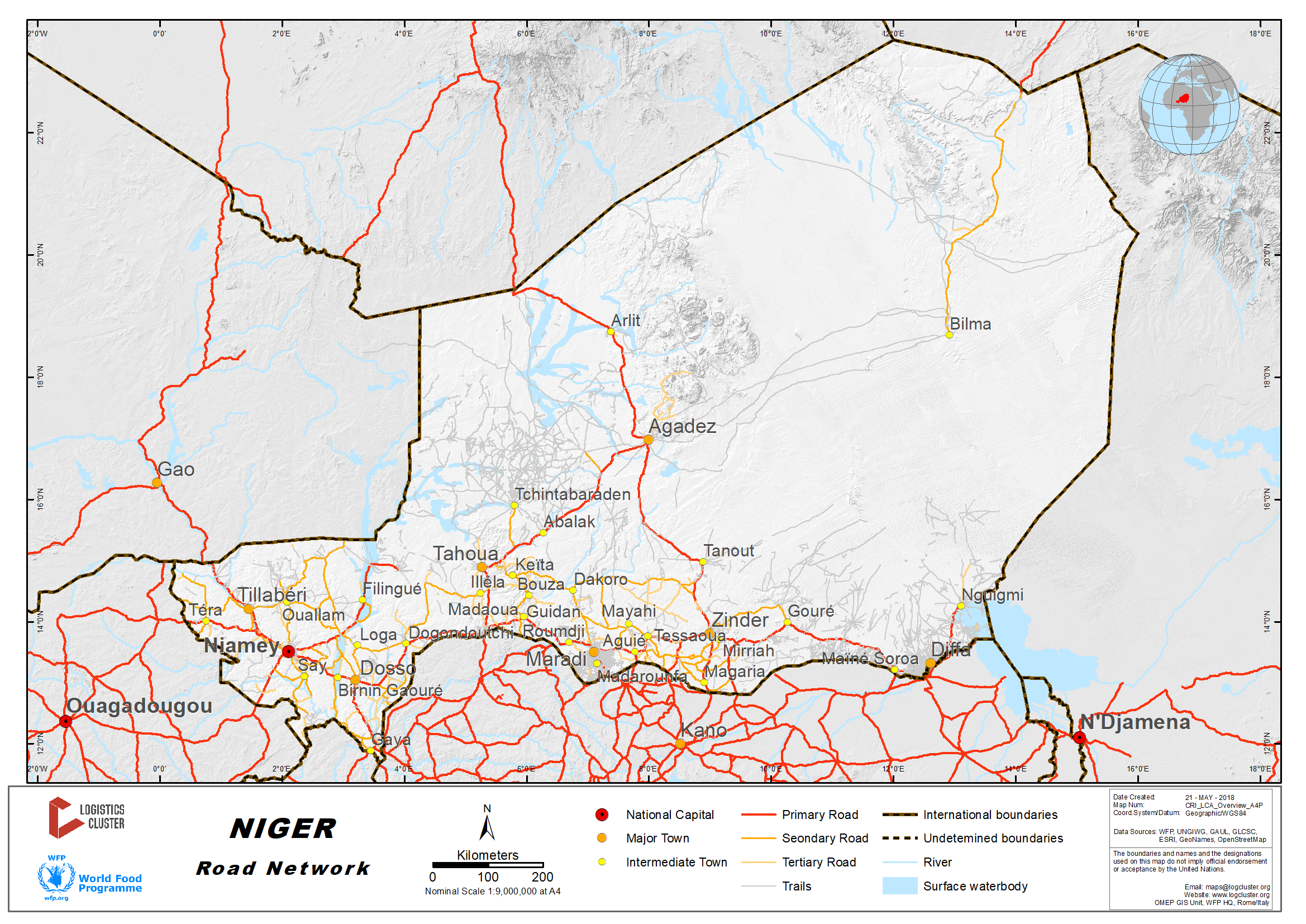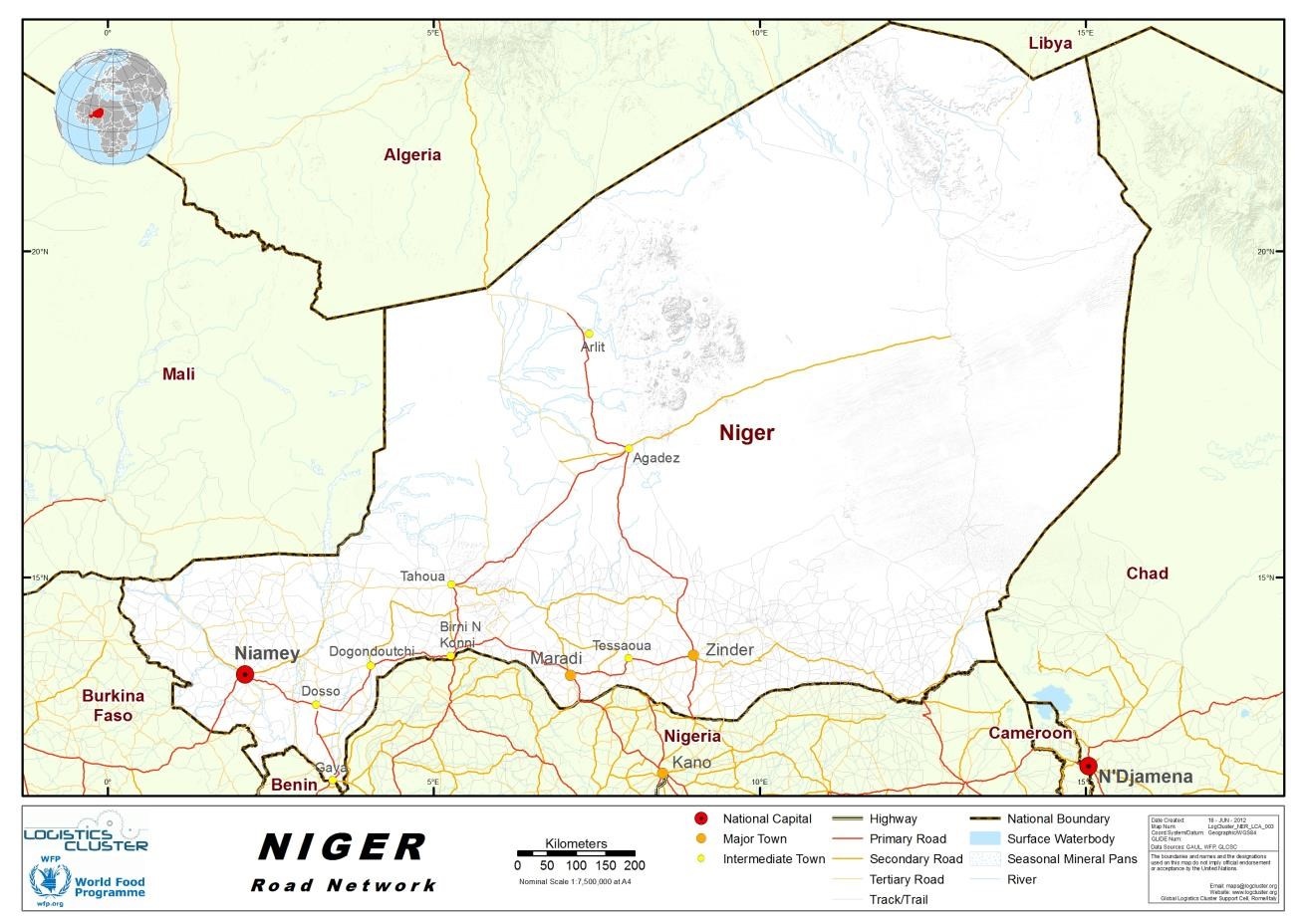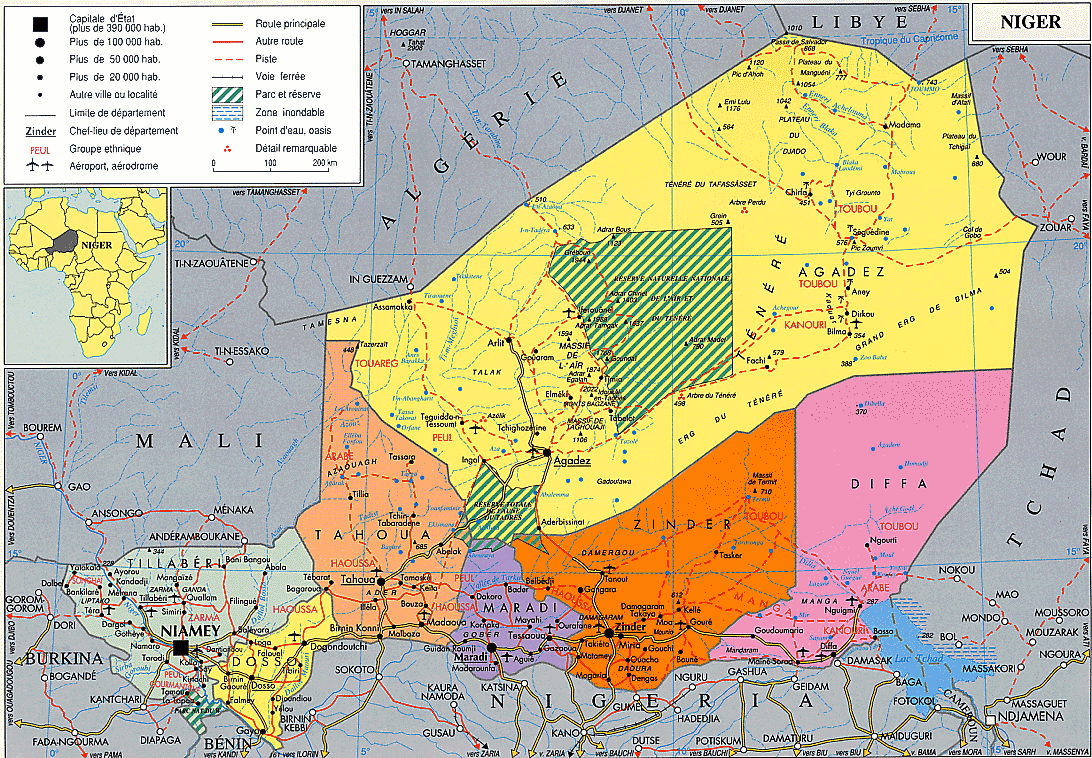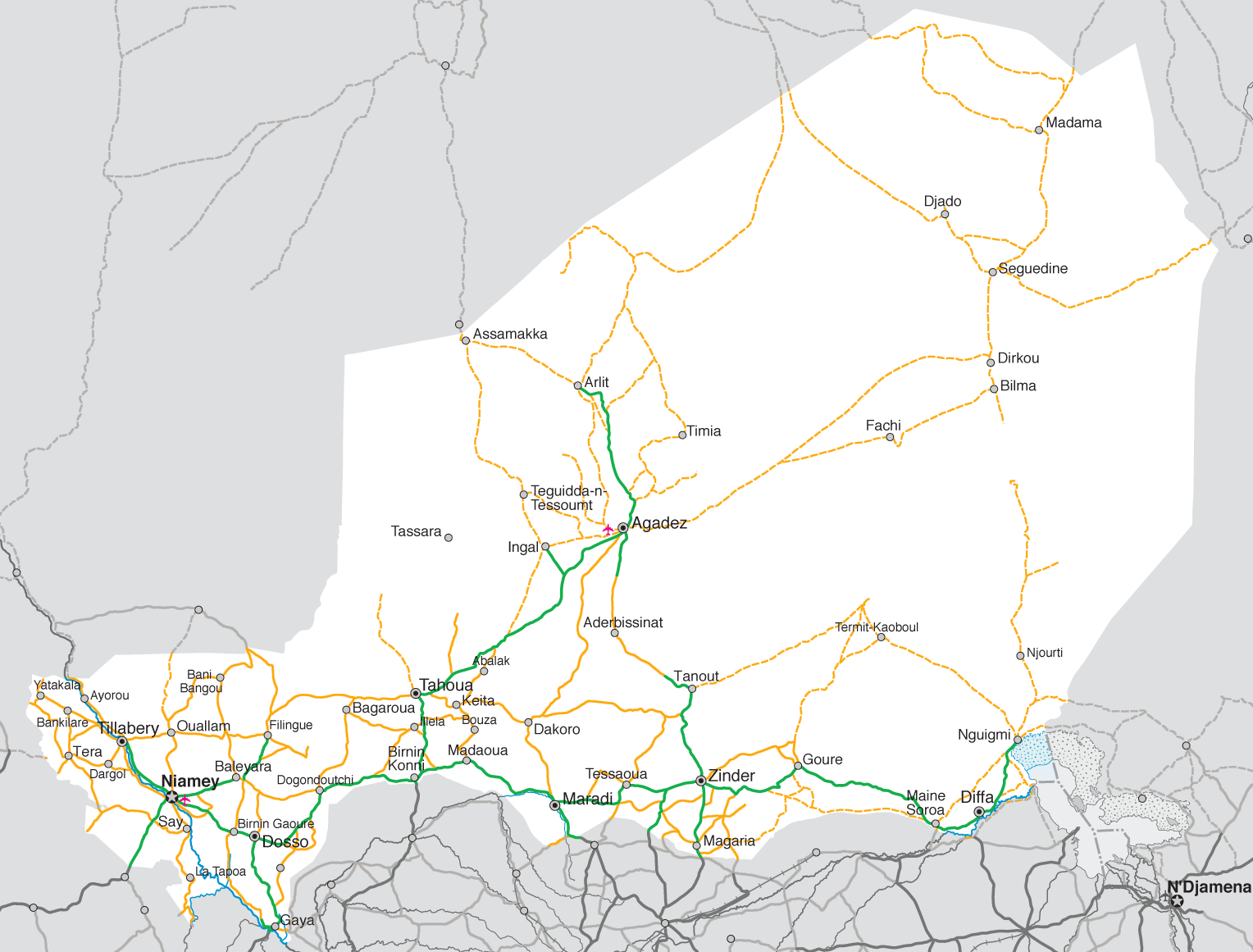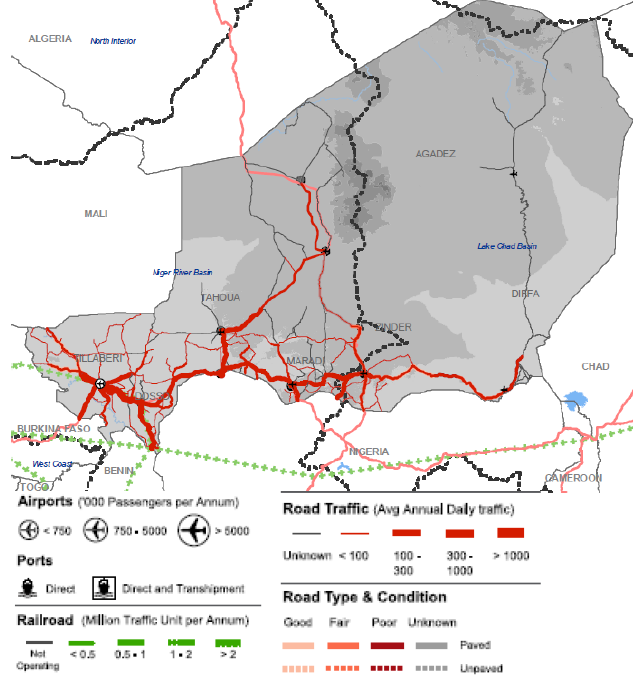2.3 Niger Road Network
The roads in Niger stretches about 18 950 kilometres. About 21 per cent of the roads are paved and classified as primary roads. Most of the paved roads can be found at the stretch between Niamey and Nguime, via Diffa, and the triangle consisting of Agadez, Zinder and Tahoua. Secondary roads make up around 13.5% and consist of lateral and gravel roads. Tertiary roads are about 7.5 per cent and are generally dirt roads. The remaining 58 per cent consists of rural tracks and trails. The road network is mostly developed in the south which is most densely populated and where most of the economic activity takes place. Agadez-Arlit is also reasonably developed as this is the centre of the uranium activity. The country itself is very large (1 267 000 km2) and distances between major towns can reach up to 1 500 kilometres. As there is neither railway nor domestic air service Niger is dependent and its road network to connect its major population centres and support economic activity. There is strong need for road rehabilitation and maintenance to keep up with economic development, but being last on the human development index, funding has been sufficient.
The main challenge and risk for bottlenecks are the state of the roads. Regional corridors on Nigerien territory are in poor condition. Reparations have been done on the Bella Gaya stretch, but the remaining stretch from Bella to Dosso is in bad shape. The Benin and Togo sides are not much better, about half the stretches remains unpaved. Improving the condition of the road network, both paved and unpaved, remains an important challenge. Financing the maintenance of road networks with low density and traffic is particularly challenging – this part of the road network will generally be more or less impassable during the wet season. Paved roads are normally well functioning, but at some stretches the surface has begun to erode and motorists have started to create side trails giving higher risk to delays and breakdowns. Secondary roads are normally in fair condition, but may be flooded in the wet season. The toughest challenges occur during the wet season when tracks and trails will be practically impassable. Although these places usually see little traffic they are often the places most in need of assistance in times of drought and short supply of food.
CAFER (Caisse Autonome de Financement de l’Entretien Routier) is the governmental entity charged with maintaining the roads. Nonetheless, CAFER is only responsible for about 10 000 kilometers which is just over half of the total road network. Of the paved roads CAFER estimates that half is in good condition, 40 per cent in fair condition while the rest is in poor condition. For the dirt roads that fall under CAFER’s responsibility over 20 per cent is characterized as in very poor condition. Not to mention the roads that are not under CAFER – these roads are supposed to be the responsibility of the Direction Générale de Pistes Rurales which so far has shown little proof of activity. CAFER gets some funding through the ministry of equipment, under which they belong, and they get some funds from road tolls which vehicles need to pay as a function of vehicle size, distance travelled and state of road. The majority of the funding for rehabilitation and maintenance is however provided by foreign agents – notably the World Bank, the European Union, BOAD (Banque Ouest Africain de Développement and the Chinese government.
For more information on government contact details, please see the following link:
Distance Matrix
|
Km |
Niamey |
Agadez |
Diffa |
Maradi |
Tahoua |
Zinder |
|---|---|---|---|---|---|---|
|
Niamey |
951 |
1 358 |
660 |
546 |
891 |
|
|
Agadez |
951 |
912 |
749 |
405 |
445 |
|
|
Diffa |
1 358 |
912 |
702 |
1 042 |
467 |
|
|
Maradi |
660 |
749 |
702 |
344 |
235 |
|
|
Tahoua |
546 |
405 |
1 042 |
344 |
575 |
|
|
Zinder |
891 |
445 |
467 |
235 |
575 |
Travel time is based on average transit time by WFP commercial transporters in 2017. Quicker trajectories are possible.
|
Days |
Niamey |
Agadez |
Diffa |
Maradi |
Tahoua |
Zinder |
|---|---|---|---|---|---|---|
|
Niamey |
7 |
5 |
4 |
2 |
3 |
|
|
Agadez |
7 |
4 |
6 |
3 |
2 |
|
|
Diffa |
5 |
4 |
2 |
2 |
2 |
|
|
Maradi |
4 |
6 |
2 |
2 |
5 |
|
|
Tahoua |
2 |
3 |
2 |
2 |
2 |
|
|
Zinder |
3 |
2 |
2 |
5 |
2 |
Road Security
Road safety throughout Niger is a concern and humanitarian agencies generally forbid travel after dark due to elevated risk of accidents. Maintenance of paved infrastructure is perpetually behind needs. To illustrate any longer stretch of road undergoing work will generally expose potholes on the stretch before the entire stretch have been completed. Secondary roads are of poor quality and will in some areas be impassable during rainfall. Roadside emergency assistance is poor to non-existent. The main causes of accidents are driver carelessness and/or exhaustion, excessive speed, poorly maintained vehicles, and poor road surfaces. Other factors include the hazardous mix of transport trucks, bicycles, mopeds, unwary pedestrians, donkey carts, animals (cattle, goats, camels), and buses on roads that are generally damaged and poorly lit. Overloaded tractor-trailers, “bush taxis,” and disabled vehicles are additional dangers on rural roads, where speeds are generally higher.
Certain parts of Niger, notably the border areas to Mali and the Diffa region, notably south-east are security risks due to threat of violence. These parts requires armed escorts by the government. Field missions requires four-wheel-drive vehicles, which can create an additional security risk due to theft as these vehicles are high in demand. Driving at night is always hazardous and should be avoided. Banditry is a continuing problem in northern and eastern Niger, as well as along the border with Mali. There have been occasional car-jackings and highway robberies throughout the country.
While taxis are available at a fixed fare in Niamey, most are in poor condition, and do not meet basic road safety standards. Inter-city “bush-taxis” are available at negotiable fares, but these vehicles (minibuses, station wagons, and sedans) are generally older, unsafe models that are overloaded, poorly maintained, and driven by reckless operators seeking to save time and money. There are several bus companies operating inter-city traffic with a relatively modern fleet. There is some concern regarding the youth of drivers, lack of training, and the speed with which the private bus companies travel the Nigerien roads.
Weighbridges and Axle Load Limits
The axle road limits have been in place for many years and Niger increased the number and placement of weight bridges back in 2009. After a vigorous start the control of these limits dwindled down and was a period not a consideration for transporters. However, Nigerien authorities reinforced the control in 2017 to the lament of the transporters.
|
Axle load limits |
NIGER |
Transit Countries UEMOA |
|---|---|---|
|
Truck with 2 axles |
18 MT |
18 MT |
|
Truck with 3 axles |
26 MT |
26 MT |
|
Truck with 4 axles |
31 MT |
31 MT |
|
Semi-trailer with 3 axles |
30 MT |
30 MT |
|
Semi-trailer with 4 axles |
38 MT |
38 MT |
|
Semi-trailer with 5 axles |
43 MT |
43 MT |
|
Semi-trailer with 6 axles |
51 MT |
51 MT |
|
Truck & drawbar trailer with 4 axles |
38 MT |
38 MT |
|
Truck & drawbar trailer with 5 axles |
46 MT |
46 MT |
|
Truck & drawbar trailer with 6 axles |
51 MT |
51 MT |
|
Truck & drawbar trailer with 7 axles |
51 MT |
51 MT |
Road Class and Surface Conditions
2.3.1 Niger Border Crossing of GAYA
Overview
Gaya hosts a Customs Office, the CNUT, Soniloga and representatives from the Police Sanitaire that are charged with controlling incoming goods. The processes normally run smoothly and can be expected to be completed within two (2) working days. Delays can arise due to problems with internet connection, and the crossing can in period be congested.
A perpetual challenge is the ratio of trucks with Nigerien registration that is enforced by the CNUT and transporters union. The rule is that two thirds (2/3) of trucks for any combined cargo should be registered in Niger. However, there is often not enough Nigerien trucks available at the ports to clear the cargo and Beninese trucks are generally cheaper. Thus the rule is often violated which can lead to problems when crossing.
|
Border Crossing Location and Contact |
|
|---|---|
|
Name of Border Crossing |
Malanville - Gaya |
|
Province or District |
Alibori Department (Benin) / Dosso Department (Niger) |
|
Nearest Town or City with Distance from Border Crossing |
Gaya 7.5km Malanville 3.4km |
|
Latitude |
011.884049 |
|
Longitude |
003.397000 |
|
Managing Authority / Agency |
Niger Customs |
|
Contact Person |
Colonel Babayé (+227 96 98 68 89) |
|
Travel Times |
|
|---|---|
|
Nearest International Airport |
Diori Hamani International Airport (Niamey) Distance in km: 227km Truck Travel Time: 3 Days Car Travel time: 4h37 |
|
Nearest Port |
Port Autonome de Cotonou 736km Truck Travel Time: 9 days Car Travel time: 10h30 |
|
Nearest location with functioning wholesale markets, or with significant manufacturing or production capacity |
Niamey 285km Truck Travel Time: 3 days Car Travel time: 4h50 |
|
Other Information
|
Border Bridge crossing. Fuel stations available en route. |
|
Hours of Operation |
|
|---|---|
|
Mondays |
800 – 1730 |
|
Tuesdays |
800 – 1730 |
|
Wednesdays |
800 – 1730 |
|
Thursdays |
800 – 1730 |
|
Fridays |
800 – 1730 |
|
Saturdays |
800 – 1730 |
|
Sundays |
Closed |
|
National Holidays
|
2018: January 1; April 24; May 1; June 15; August 3, 22, 23; November 20; December 18. Muslim holidays subject to change according to lunar position. |
|
Seasonal Constraints |
Rainy season June to September |
Daily Capacity
There is a separate lane for private cars. Vehicles that are not carrying cargo will be charged between 30 USD and 60 USD depending on the type of vehicle by Soniloga. North of 100 vehicles crosses the border on a daily basis.
Customs Clearance
The Customs Office requires and invoice and packing list for the cargo. They will also require a BESC/ECTN (Bordereau Electronique de Suivi des Cargaisons / Electronic Cargo Tracking Note) if the goods are coming in through the ports. If the goods originate in the region at Certificate of origin with the value of the goods are required instead of the BESC/ECTN). The CNUT will check the waybills and that the ratio of Nigerien trucks is respected – 2/3 registered in Niger. La Police Sanitaire will check that food items have their phytosanitary certification.
Delays can be expected when the crossing is congested, import of food items peak around April to July. Connection issues are a recurrent problem that will cause delays. Otherwise not respecting the Nigerien truck ratio can block the trucks at the border.
Each truck is charged USD 10 for customs declaration and an additional USD 10 for extra-legal labour. On top of this comes phytosanitary fees of USD 1 per metric ton and an escort fee by destination, in USD:
|
Dosso |
Niamey |
Maradi |
Tillabery |
Arlit |
Azelik |
Konni |
Magaria |
Agadez |
Zinder |
Malbaza |
Tahoua |
Diffa |
|---|---|---|---|---|---|---|---|---|---|---|---|---|
|
50 |
50 |
150 |
110 |
350 |
254 |
134 |
310 |
290 |
280 |
134 |
174 |
364 |
For more information on customs in NIGER, please see the following link:
Other Relevant Information
Trucks and containers are not opened and inspected at the crossing. This is performed at the regional Customs Offices where the goods are destined. For this reason the process is relatively fluid and will normally be done within 48 hours maximum.
There is no weighing at Gaya. This control is performed in Dosso.
Goods intended for transit through Niger needs transit authorisation to be let through. Pharmaceutical goods needs special import permit that can be obtained from the Health Ministry. Dangerous goods also requires special import permit.
For more information on government contact details, please see the following link:
2.3.2 Niger Border Crossing of Torodi
Overview
The crossing at Torodi is set up the same way as the one at Gaya and share the same challenges.
Torodi hosts a Customs Office, the CNUT, Soniloga and representatives from the Police Sanitaire that are charged with controlling incoming goods. The processes normally run smoothly and can be expected to be completed within two working days. Delays can arise due to problems with internet connection, and the crossing can in period be congested.
A perpetual challenge is the ratio of trucks with Nigerien registration that is enforced by the CNUT and transporters union. The rule is that two thirds (2/3) of trucks for any combined cargo should be registered in Niger. However, there is often not enough Nigerien trucks available at the ports to clear the cargo and Togolese trucks are generally cheaper. Thus the rule is often violated which can lead to problems when crossing.
|
Border Crossing Location and Contact |
|
|---|---|
|
Name of Border Crossing |
Kantchari – Torodi |
|
Province or District |
Kantchari Department (Benin) / Say Department (Niger) |
|
Nearest Town or City with Distance from Border Crossing |
Torodi 46.4km Kantchari 33.4km |
|
Latitude |
012.738708 |
|
Longitude |
001.633797 |
|
Managing Authority / Agency |
Niger Customs |
|
Contact Person |
Commandant Amaber (+227 96 00 70 00) |
|
Travel Times |
|
|---|---|
|
Nearest International Airport |
Diori Hamani International Airport (Niamey) Distance in km: 116km Truck Travel Time: 1 day Car Travel time: 1h43 |
|
Nearest Port |
Port Autonome de Lomé 970km Truck Travel Time: 14 days Car Travel time: 14h14 |
|
Nearest location with functioning wholesale markets, or with significant manufacturing or production capacity |
Niamey 109km Truck Travel Time: 1 day Car Travel time: 1h39 |
|
Other Information
|
Fuel stations available en route. |
|
Hours of Operation |
|
|---|---|
|
Mondays |
800 – 1730 |
|
Tuesdays |
800 – 1730 |
|
Wednesdays |
800 – 1730 |
|
Thursdays |
800 – 1730 |
|
Fridays |
800 – 1730 |
|
Saturdays |
800 – 1730 |
|
Sundays |
Closed |
|
National Holidays
|
2018: January 1; April 24 ; May 1; June 15; August 3, 22, 23; November 20; December 18. Muslim holidays subject to change according to lunar position. |
|
Seasonal Constraints |
Rainy season June to September |
Daily Capacity
There is a separate lane for private cars. Vehicles that are not carrying cargo will be charged between 30 USD and 60 USD depending on the type of vehicle by Soniloga. Around 30 vehicles passes on a daily basis.
Customs Clearance
The Customs Office requires and invoice and packing list for the cargo. They will also require a BESC/ECTN (Bordereau Electronique de Suivi des Cargaisons / Electronic Cargo Tracking Note) if the goods are coming in through the ports. If the goods originate in the region at Certificate of origin with the value of the goods are required instead of the BESC/ECTN). The CNUT will check the waybills and that the ratio of Nigerien trucks is respected – 2/3 registered in Niger. La Police Sanitaire will check that food items have their phytosanitary certification.
Delays can be expected when the crossing is congested, import of food items peak around April to July. Connection issues are a recurrent problem that will cause delays. Otherwise not respecting the Nigerien truck ratio can block the trucks at the border.
Each truck is charged USD 10 for customs declaration and an additional USD 10 for extra-legal labour. On top of this comes phytosanitary fees of USD 1 per metric ton and an escort fee by destination, in USD:
|
Dosso |
Niamey |
Maradi |
Tillabery |
Arlit |
Azelik |
Konni |
Magaria |
Agadez |
Zinder |
Malbaza |
Tahoua |
Diffa |
|---|---|---|---|---|---|---|---|---|---|---|---|---|
|
62 |
22 |
222 |
82 |
358 |
182 |
142 |
302 |
298 |
302 |
142 |
182 |
406 |
For more information on customs, please see the following link:
Other Relevant Information
Trucks and containers are not opened and inspected at the crossing. This is performed at the regional Customs Offices where the goods are destined. For this reason the process is relatively fluid and will normally be done within 48 hours maximum.
Control of weigh with respect to the load limit of the trucks is performed at Makalondi, before arriving at Torodi.
Goods intended for transit through Niger needs transit authorisation to be let through. Pharmaceutical goods needs special import permit that can be obtained from the Health Ministry. Dangerous goods also requires special import permit.
For more information on government contact details, please see the following link:
